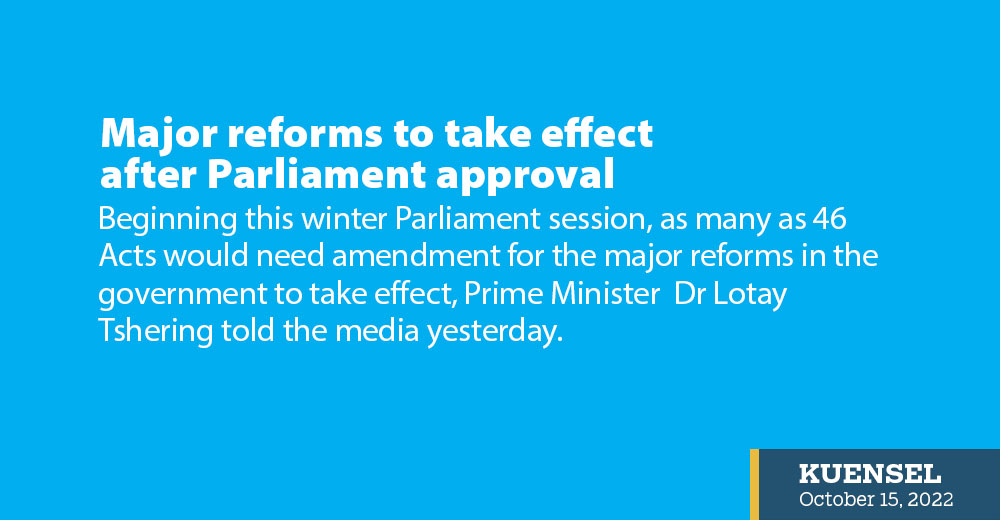… PM urges Bhutanese to reflect on the evolution, appreciate
Tshering Palden
Beginning this winter Parliament session, as many as 46 Acts would need amendment for the major reforms in the government to take effect, Prime Minister Dr Lotay Tshering told the media yesterday.
Lyonchhen said that most of the major reforms will need to be passed by the Parliament. “Implementation can begin only then.” The major reforms are aimed at overhauling the system and removing bureaucratic hurdles and make things convenient, be it as simple as applying for a trade license, he said.
“The principle of the reform is to make Bhutan a high income country and as soon as possible,” he said. For that to happen, Lyonchhen said the economy has to develop faster and become more conducive. “For that the reforms are necessary.”
He said it is common knowledge that to become a high income country, private sector should be developed for which removing the bureaucratic hurdles is critical. To make things easier, all relevant agencies would be put together one ministry or cluster.
For instance, applying for an environment clearance today one has to run to numerous offices scattered across different ministries. The government has proposed to merge the Department of Forests, and National Environment Commission under environment ministry.
The reforms would address such bureaucratic issues and set up redressal mechanisms and to hold officials accountable if services are not delivered within the stipulated time, he said.
All agencies with major economic mandates have been proposed to be clubbed under the economic cluster.
An individual each would be mandated to manage a cluster. The security cluster would comprise of foreign ministry, home and cultural affairs, police. “So that there is no need to run from pillar to post,” Lyonchhen said. “And the reforms are gradually taking shape.”
Lyonchhen said that the reforms the government is rolling out is the structural. However, the main reform would be “reforming ourselves.”
“The vision of the reforms is that access to whatever we have should be given equally to everyone,” he said. The government has proposed to the Parliament to reduce the number of ministries to nine, rename and reshuffle organisations and individuals under more relevant institutions.
“Organising ourselves based on individual capacities after assessment or recruit people based on one’s academic credentials,” lyonchhen said.
The RCSC commission is also looking at civil service reform with an open mind. They are exploring mechanisms for employees to opt in and opt out, let civil servants leave for greener pastures and also letting those with experience and expertise join the system, Lyonchhen said.
Those who joined the civil service at the same time but shouldered different responsibilities and performed differently should also be recognised differently based on meritocracy and without nepotism, he said.
“These are the basics of a high end society and the qualities for the country to enter a high income group,” lyonchhen said.
He said that major reforms are underway at the institution level . Everyday there are few committee meetings happening.
Lyonchhen said that reforms that need not go to Parliament have been initiated. For instance, the Gross National Happiness Commission has been merged with CBS, finance ministry and the Cabinet. “Everything that used happen at GNHC will now happen in a more coordinated way,” he said.
Those in research division of GNHC will be merge CBS, the budgeting functions will be merged with finance ministry under the Department of Budget and Planning, and the prospective planning will be clubbed under the Cabinet secretary. The Cabinet secretariat will also look after the master planning and human resources of the country, lyonchhen said.
Prime Minister issued an executive order on October 9 merging the National Statistics Bureau into the Centre for Bhutan and GNH Studies (CBS) with immediate effect. The NBS office will be housed in Zhichenkhar in Thimphu.
The order from the Lhengye Zhungtshog citing Article 20(8) of the Constitution to enable changes in the scope of the organizations under it, towards a better system structure for people, GNH and the nation’s everlasting future.
Lyonchhen said that this decision was part of the rationale of civil service reform, consolidating effectiveness, compactness and efficiency of the civil service to enhance the delivery of various outputs.
“This decision has been taken recognising statistics and data as a leverage point transformation, and in particular to make qualitative and quantitative research support evid
policy-making and practice with greater validity,” the order stated.
Lyonchhen said that it was also made in order to realise the full potentials of research staff and statisticians by making pertinent quantitative and qualitative data more easily available to each other, and to various users as a whole.
With respect to the statistical functions within the CBS, just as research functions of the
the CBS, the autonomy and objectivity of their results and findings will remain unaffected.


